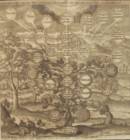Svitlana Potapenko (Frankfurt)
Peter I, the Rozumovsky Brothers, and Kyiv as the Second Jerusalem: Toward the Intellectual History of Ukraine in the mid-18th Century
13.07.2023 14:15 Uhr – 15:45 Uhr
Oberseminar der Professur für Geschichte Russlands und Ostmitteleuropas in der Vormoderne
Die Veranstaltung findet per Zoom statt:
Meeting beitreten
Meeting-ID: 659 7144 5334
Kenncode: 899101
Abstract
In this presentation, I want to share my explorations of the works authored by the Kyivan ecclesiastical intellectual, a poet and a teacher of the Kyivan Academy, Mykhailo Kozachynsky (1699-1755), namely: the trilingual panegyrics Augustissimae ac Invictissimae Imperatrici (Kyiv, 1744) and Philosophia Aristotelica (Kyiv, Lviv, 1745), as well as the dramatic play The Benevolence of Marcus Aurelius Antoninus (Kyiv, 1744; Lviv, 1745). These literary works contributed to both – the construction of the cult of Peter I as the Russian victorious sovereign and the promotion of Oleksii and Kyrylo Rozumovskys as the Ukrainian political leaders. What concerns the former, Kozachynsky composed one of the earliest known biographies of the emperor entitled “Journal or Description of the Years and the Glorious as well as Solemn Victories of the Blessed and Everlasting Memory Peter the Great, Pater Patriae, the First All-Russian Emperor” that appended Augustissimae ac Invictissimae Imperatrici. As for the latter, Kozachynsky equipped the sons of a rank-and-file Cossack with a legendary yet prestigious princely genealogy, what should have increased the chances of Kyrylo to be elected on the vacant hetman’s post. Interesting enough, in his attempts to praise Peter I through eulogizing his ruling daughter the Empress Elizabeth, Kozachynsky appealed to Kyiv as the Second Jerusalem – the fact that has not been so far properly considered in the scholarship. Hence, my intention is to take a broader view on the Mykhailo Kozachynsky’s poetic legacy in the context of the intellectual history and Ukrainian-Russian political relations of the time.


